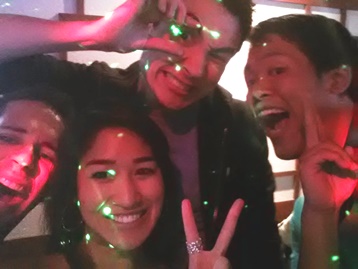More than 17,000 U.S. allopathic medical school seniors and 16,000 other applicants participated in a physician rite of passage this week—the Match. From finding out whether they matched to a residency program on Monday to the final reveal of where they will be working on Friday, Match Week is fraught with nerves, emotions and lots of tradition.
“I think I’ll look back at this as one of the highlights of my medical career,” said Amy Ho, a fourth-year medical student at the University of Texas Southwestern Medical School.
(CAPTION: Amy Ho and fellow fourth-year medical students at the University of Texas Southwestern Medical School celebrate at a karaoke party as part of their Match Week festivities.)
Match Week is spread out, with students finding out from the National Resident Matching Program whether or not they matched on Monday. They have to wait four agonizing days before hearing the location of their residency program on Friday. For many, the wait can seem excruciatingly long.
“After I found out I matched, I felt relief for about five minutes, then a rush of excitement for Friday when I find out where I’m going,” said Bradley Burmeister, a fourth-year medical student at Michigan State University College of Human Medicine. “I’m hoping I can keep my mind off the wait.”
Medical schools handle the Match differently, but all approach the big week with a sense of celebration, both as a way to highlight the seniors’ work and to keep them busy while they wait for Friday. For most seniors, this was the last week they would be together with their classes. Many students see it as even bigger than graduation.
“It’s a culmination of four years of hard work, and I want to celebrate with my friends, colleagues and faculty,” said Christian Pulcini, a fourth-year medical student at Tufts University School of Medicine.
Students shared their relief and joy at being matched on Twitter.
Many students who don’t match took part in the Supplemental Offer and Acceptance Program® to try to obtain an unfilled residency position. Experts estimate that a larger number of U.S. medical students may not match this year, which had many seniors worried. In 2013, more than 40,000 applicants vied for residency positions, and about 94 percent matched.
The increasingly competitive nature of the Match is reflected in the data. More than 500 U.S. medical graduates had not found a residency position by the end of Match Week last year, which was double the number from 2012. Meanwhile, potential federal funding cuts threaten existing residency programs. The AMA’s SaveGME campaign is working to preserve funding for medical residency slots.
The insufficient number of residency slots for seniors and other medical graduates “should put a red flag in the mind of every legislator concerned with the picture of our health care system today,” Ho said.
Read AMA Wire™ next week to learn about Match results.




